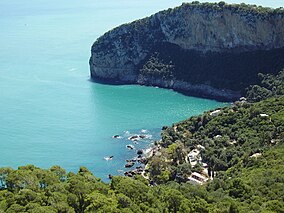The national park of Gouraya (Arabic: الحديقة الوطنية قورايا) is one of the coastal national parks of Algeria. It is located in Béjaïa Province, near the shrine of Sidi Touati.
| Gouraya National Park | |
|---|---|
 The Aiguades | |
| Location | Béjaïa Province, Algeria |
| Nearest city | Béjaïa |
| Coordinates | 36°46′N 5°6′E / 36.767°N 5.100°E |
| Area | 20.8 km2 (8.0 sq mi) |
| Established | 1984 |
| Visitors | 60.000 (in 2005) |
 | |
History
editThe park became an Algerian National Park in 1984, and has been UNESCO-recognized as a biosphere reserve in 2004.[1]
Description
editThe park owes its name to the Gouraya Mountain (altitude 660m) located within the park's boundaries.[2] The ground elevation in the park oscillates between -135m and 660m. There is also a lake, the Lake Mézaïa.[1]
The park is located on a calcaro-dolomitic ground.[3]
The park is north-east of Béjaïa, close to the city. The park includes many beaches and cliffs, which make it a swimming destination for many Algerians.
Population
editThe permanent population in the Gouraya National Park is of Berber origins, 1,655 inhabitants across 13 villages.[1]
Wildlife
editThe park is home to a wide variety of flora and fauna, including Barbary macaques and jackals who live in the park's forests. The Barbary macaque is a primate with a very restricted range in portions of northwestern North Africa and disjunctively in Gibraltar.[1]
In 2011, the French Institut National de la Recherche Agronomique led a phytosociological study which concluded there were 7 vegetation groups belonging to 4 phytosociological classes:[3]
- Quercetea ilicis Braun-Blanquet (1947)
- Querco-Fagetea Braun-Blanquet & Vlieg (1937)
- Crithmo-limonielea Braun-Blanquet (1947)
- Asplenietea rupestris (H.M) Braun-Blanquet (1934)
- Protected fauna[1]
- Tree spurge (Euphorbia dendroides)
- Prickly juniper (Juniperus oxycedrus)
- Endangered animals[1]
- barbary apes (Maccaca sylvanus)
- Jackals (Canis aureus algeriensis)
- Wild cats (Felis silvestris)
- Algerian hedgehogs (Erinaceus algirus)
- Marine mammals of national importance[1]
- Sperm whales (Physeter macrocephalus)
- Short-beaked common dolphins (Delphinus delphis)
- Bottlenose dolphins (Tursiops truncatus)
- Harbour porpoises (Phocoena phocoena)
Gallery
edit-
Yemma Gouraya, next to Béjaïa.
-
The city of Bougie at the base of Yemma Gouraya mountain.
-
Monkeys' peak (Pic des singes), above the Cap Carbon.
-
Fort Gouraya, which culminates at 672m.
-
Dead fish on the river Summam, probably from pesticide pollution due to heavy rains (2008).
References
edit- ^ a b c d e f g Biosphere Reserve Information, Unesco.org, 3 April 2006
- ^ Gouraya National Park - Biodiversity at its Best, Algeria.com
- ^ a b K. Rebbas, Errol Véla, Approche phytosociologique du Parc National de Gouraya (Béjaïa, Algérie), Inra.fr, 2011
